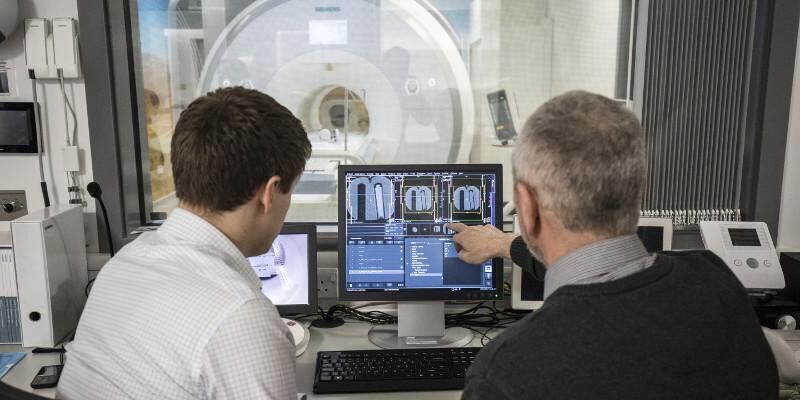
A new £6.8m medical imaging centre which aims to transform the diagnosis and treatment of patients suffering from cancer, heart disease and musculoskeletal diseases has opened.
The Advanced Imaging Centre is a collaboration between the University of Leeds, University of York and Leeds Teaching Hospitals Trust. It comprises identical state of the art MRI facilities at Leeds General Infirmary and at the University of York.
The researchers will work on a new imaging method which could boost the signal in MRI scanners by up to 200,000 times.
This will give medical professionals new insights into the workings of the human body in health and illness, and also has the potential to make the development of new drugs more effective.
Development
The technique, which is known as Signal Amplification by Reversible Exchange, or SABRE, has been developed by scientists at the University of York.
It works by temporarily changing the magnetic properties of substances that occur naturally in the body, or drugs, without changing their molecular structure.
Laboratory tests have shown that the method is successful, and now the team will use the new facilities to develop the technique for use with patients.
While this is ongoing, doctors at Leeds General Infirmary will be able to use the equipment for standard MRI scanning of patients as well.
Support
The centre has been funded through the Clinical Research Infrastructure Initiative, led by the Medical Research Council (MRC) with co-funding from the British Heart Foundation and Arthritis Research UK.
Research team leader, BHF Professor Sven Plein, from the School of Medicine at the University of Leeds, said: “The new method has the potential to transform the way patients are diagnosed because we will be able to see bodily processes such as metabolism, or inflammation, in much greater detail than with current methods.
“Eventually we hope that this technique, developed here in Yorkshire, can be applied to many MRI centres in the country and worldwide as a low cost alternative to methods in current use elsewhere.”
Gary Green, Professor of Neuroimaging at the University of York, added: “Our collaboration will enable us to exploit the dramatic gains we have made in improving the sensitivity of MRI devices.
“The funding we have received is crucial and timely, and recognises the strategic importance of the combined Leeds and York teams.”
Heart and arthritis research
Professor Sir Nilesh Samani, Medical Director at the British Heart Foundation said: “The game-changing imaging techniques offered by this new facility have the potential to revolutionise our understanding of what happens in a person’s heart and how cardiovascular diseases develop.
“We are delighted that BHF Professor Sven Plein, whose imaging research has already improved the way patients with heart disease are diagnosed, will be leading this exciting unit.
“The BHF's research mission to fight heart diseases is largely funded by the public. We are immensely grateful to all our donors who have made it possible for us to support the establishment of this facility.”
Dr Natalie Carter, head of research liaison and evaluation at Arthritis Research UK, said the centre would also help improve doctors’ understanding of arthritis, a condition which affects 10 million people in the UK.
She said: “We hope that this new technology will help us push back the limits of arthritis by making it easier for people living with it to be given a quicker and more accurate diagnosis.”
Further information
Journalists requiring more details or interviews should contact Sophie Freeman in the University of Leeds press office on 0113 343 8059 or email s.j.freeman@leeds.ac.uk
The photograph shows (L-R) David Broadbent, Clinical Scientist (MRI Physics) at Leeds Teaching Hospitals NHS Trust and Ross Devlin, Senior Radiographer at the University of York, in the Advanced Imaging Centre at Leeds General Infirmary.